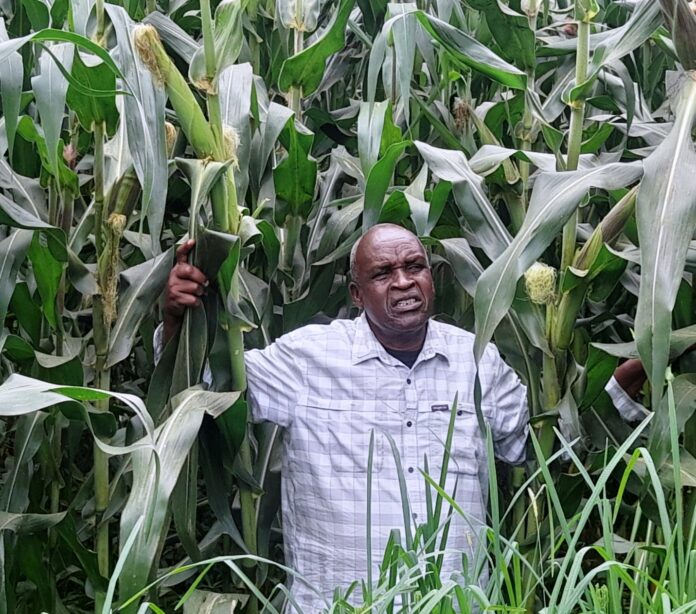
By Emanuel Kipkorir Tarus, DevReporter, Trans Nzoia County
When he assumed office on 13 September 2022, President William Ruto immediately did away with the previous government’s subsidy programme on basic essential commodities, saying that it was not sustainable.
Instead, Ruto’s administration resorted to subsidising production where over four million farmers were registered across the country to benefit from government’s subsidised farm inputs.
In this new approach, the government is selling fertilizer to registered farmers at subsidised prices across the country through the National Cereals and Produce Board (NCPB).
RBNews did a follow up to see how the concept of subsidised fertilizer was performing in Trans Nzoia County, often referred to as the country’s food basket, and spoke to different maize farmers.
Jane Tallam, a large-scale farmer in Chematich area of Cherang’any Constituency, said that she took advantage of the fertilizer subsidy programme, and she is expecting bumper harvest this year.
“Just like other farmers in our county, I am very optimistic that we shall have a good harvest this year because, unlike previous years, the cost of production has come down substantially this time around and farmers have been able to use fertilizer in sufficient quantities,” Ms. Tallam said.
Another farmer, Philemon Samoei, based in Lessos, Kwanza Constituency, expressed optimism about the fertilizer subsidy programme despite initially having doubts.
“Although we were worried at first when the government rolled out the subsidy programme because we were not sure of the quality of the fertilizer, we are now convinced that soon this country will be food secure and people will have money in their pockets for development,” stated Mr. Samoei.
Mr. Jonathan Melly, another large-scale farmer, said that land that had been left uncultivated because of costly fertilizer, are now covered with crops.
“Many pieces of land that were left lying idle because of the high cost of production are now green,” Mr. Melly said.
Mr. Benson Gateru, a farmer in Kapkoi village, Kwanza Constituency expressed confidence that the country will feed her people using locally produced food instead of relying on imports.
“This government made the right decision to subsidise fertilizer. The programme encouraged farmers to go back to farming. You know the country’s food security begins at the household level. If we all can feed ourselves, the cartels that normally import maize will have no place,” Gateru stated.
After using blended subsidised fertilizer to plant maize, Jeremiah Njuguna, a farmer in Saboti, said the maize is doing well in the farm.
“This is a very unique year for us. For the first time after very many years, we have seen suckers in our maize fields, an indication that the fertilizer we used is very nutritious,” Mr. Njuguna said.
“Farmers in all the maize growing counties are very happy with fertilizer subsidy programme. I have visited farms in Trans Nzoia, Uasin Gishu, Nandi, West Pokot, Bungoma as well as other counties, and all the farms are very green. Achieving food security is therefore guaranteed,” said Mr. Peterson Obuba, the Manager of Kipakren NCPB depot in Uasin Gishu County.
He further said that because of the anticipated high yields, the NCPB’s stores are being prepared to store the produce.
“We are now preparing our silos across all the maize growing counties to be ready to store the produce from farms.
“Through the Warehouse Receipt System, farmers can deposit their maize and other crops to our stores and be given a receipt which they can use as collateral for loans,” Mr. Obuba further said.
Kwanza Constituency Member of Parliament, who is also a member of the Agriculture and Livestock Committee in the National Assembly, Hon. Ferdinard Wanyonyi, said the fertilizer subsidy programme is the one the government relies on to lower the cost of production, increase foreign exchange, create jobs and end poverty, as well as promote industrialisation in the country.
“The government has a deliberate plan to ensure that we move away from being food insecure to food secure. It will invest Ksh. 250 billion in the next five years to boost agriculture and food security,” Hon. Wanyonyi said.
Early this year, the government rolled out a nationwide campaign to register farmers to develop a digitised national farmers’ database for easy planning.
Over 5 million farmers were registered in the drive. In the first phase of the subsidy programme, the government allocated Ksh. 10.2 billion and a tender was awarded to Mashambani Farm Inputs Eldoret Ltd to supply fertilizer to the Kenya National Trading Corporation.
In the controversial 2023/2024 financial year budget, the treasury has allocated to Ksh. 49.9 billion to the Ministry of Agriculture, out of which Ksh. 4.5 billion shillings is meant for the fertilizer subsidy programme.
Article 43 (1) (c) of the constitution guarantees every Kenyan the right to be free from hunger and to have adequate food of acceptable quality.





